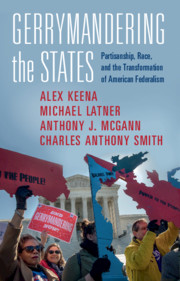Crossref Citations
This Book has been
cited by the following publications. This list is generated based on data provided by Crossref.
Ramsay, Alec
2021.
Estimating Seats–Votes Partisan Advantage.
SSRN Electronic Journal ,
Warshaw, Christopher
McGhee, Eric
and
Migurski, Michal
2022.
Districts for a New Decade—Partisan Outcomes and Racial Representation in the 2021–22 Redistricting Cycle.
Publius: The Journal of Federalism,
Vol. 52,
Issue. 3,
p.
428.
Krieger, Nancy
Testa, Christian
Chen, Jarvis T.
Hanage, William P.
and
McGregor, Alecia J.
2022.
Relationship of Political Ideology of US Federal and State Elected Officials and Key COVID Pandemic Outcomes During the Vaccine Era: April 2021-March 2022.
SSRN Electronic Journal ,
Krieger, Nancy
2023.
Minority Rule: A Lethal Threat to the People's Health, Democracy, and our Planet.
International Journal of Social Determinants of Health and Health Services,
Vol. 53,
Issue. 1,
p.
11.
Taylor, Zack
Lucas, Jack
Kirby, J. P.
and
Hewitt, Christopher Macdonald
2023.
Canada's Federal Electoral Districts, 1867–2021: New Digital Boundary Files and a Comparative Investigation of District Compactness.
Canadian Journal of Political Science,
Vol. 56,
Issue. 2,
p.
451.
Niven, David
2023.
The influence of gerrymandering on abortion policy in the United States.
Routledge Open Research,
Vol. 2,
Issue. ,
p.
34.
Emmenegger, Patrick
and
Walter, André
2024.
Partisan districting and the adoption of proportional representation: gerrymandering and its discontents.
European Political Science Review,
Vol. 16,
Issue. 2,
p.
187.
Beitz, Charles R
and
Brady, Henry E
2024.
For the People?.
Basmajian, Alyssa L.
2024.
Reproductive gerrymandering, bureaucratic violence, and the erosion of abortion access in the United States.
Medical Anthropology Quarterly,
Vol. 38,
Issue. 2,
p.
179.
Wiedekind, Jakob
2024.
„The new normal“: Warum die Republikanische Partei Trumps Partei bleibt, obwohl er 2020 verloren hat.
GWP – Gesellschaft, Wirtschaft, Politik,
Vol. 73,
Issue. 2,
p.
143.
Leonard, Meghan E
2024.
Democratic Backsliding in the American States: The Case of Judicial Independence.
Publius: The Journal of Federalism,
Vol. 54,
Issue. 3,
p.
573.
Brewster, Chris
Brookes, Michael
and
Wood, Geoffrey
2024.
Disaggregating the liberal market economies: Institutions and HRM.
Economic and Industrial Democracy,
Abowitz, Kathleen Knight
2024.
The Cambridge Handbook of Ethics and Education.
p.
597.
2024.
The Cambridge Handbook of Ethics and Education.
p.
593.
Cooper, Christopher A.
Huffmon, Scott H.
Gibbs Knotts, H.
and
McKee, Seth C.
2024.
Population change, racial settlement patterns, and the newest southern electorate.
Politics, Groups, and Identities,
p.
1.



